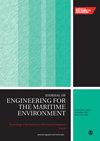利用时间差学习实现海浪能量转换器中提取能量的在线最大化
IF 1.5
4区 工程技术
Q3 ENGINEERING, MARINE
Proceedings of the Institution of Mechanical Engineers, Part M: Journal of Engineering for the Maritime Environment
Pub Date : 2023-01-27
DOI:10.1177/14750902221149468
引用次数: 0
摘要
本文提出了一种结合蒙特卡罗和动态规划的时域差分学习方法来控制单体波能转换器。由于TD方法是为了解决预测问题而设计的,我们利用这一特征来最大化从海浪中捕获的能量。在状态矩阵中隐式地求解浮标系统的入力,从而将问题设计成TD框架。为了提高WEC的捕获功率,该控制方法具有在线主动控制功能。这将有助于设备根据之前在相同情况下的经验预测最佳控制器。采用了Q-Learning和SARSA两种TD方法,分析了其特点,并在仿真部分实现了若干测试功能。为了实现在线最优控制,力控制作为控制器,并在特定次数后以适当的速率显著调整TD系数。将建议的TD方法与PGM、IPOPT和其他学习控制策略进行了比较。通过应用不同海况,并分析由此产生的WEC动力学,对控制器的有效性进行了计算机仿真。本文章由计算机程序翻译,如有差异,请以英文原文为准。
Online maximization of extracted energy in sea wave energy converters using temporal-difference learning
This article presents temporal-difference (TD) learning which is a combination of Monte Carlo and dynamic programing (DP) as a Method for controlling single-body wave energy converters (WECs). Since TD methods are designed to solve the prediction problems, we use this feature to maximize the energy captured from the sea waves. The entered force to the buoy system is addressed implicitly in the state matrix to design the problem into a TD framework. In order to enhance the captured power by the WEC, the control method is built to have an online active control. This will help the device to predict the best controller based on its previous experiences in the same situations. Two methods of TD, Q-Learning and SARSA, are used and the features are analyzed and several testing functions are carried out in simulation part. To perform on-line optimal control, a force control has acted as a controller and TD coefficients are tuned at a proper rate significantly after specific number of episodes. The power of suggested TD methods is compared to PGM, IPOPT and with other learning control strategies. Several computer simulations were carried out to evaluate the controller effectiveness by applying different sea-states and analyzing the resultant WEC dynamics.
求助全文
通过发布文献求助,成功后即可免费获取论文全文。
去求助
来源期刊

CiteScore
3.90
自引率
11.10%
发文量
77
审稿时长
>12 weeks
期刊介绍:
The Journal of Engineering for the Maritime Environment is concerned with the design, production and operation of engineering artefacts for the maritime environment. The journal straddles the traditional boundaries of naval architecture, marine engineering, offshore/ocean engineering, coastal engineering and port engineering.
 求助内容:
求助内容: 应助结果提醒方式:
应助结果提醒方式:


